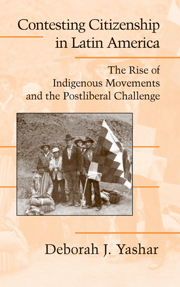 Contesting Citizenship in Latin America
Contesting Citizenship in Latin America Book contents
6 - PERU: WEAK NATIONAL MOVEMENTS AND SUBNATIONAL VARIATION
Published online by Cambridge University Press: 05 September 2012
Summary
The current situation of indigenous people is of virtual abandonment and lack of legal protection…. In comparison with other sectors, indigenous participation, as individuals and as peoples, in the political activities of the country, is very limited
(Américo Javier Aroca Medina 1999: 1–2).In the 1780s, Tupak Amaru mobilized a widespread rebellion in the south of Peru. The indigenous leader intended to reassert Incan authority and indigenous autonomy. While the Spanish authorities put down the indigenous rebellion, its memory has grown as South America's most widespread and significant indigenous mobilization. Indigenous leaders throughout the Andes refer to this uprising, its lofty goals, and the possibility of power in numbers.
Two centuries later, widespread mobilizations once again emerged in the Peruvian countryside. Sendero Luminoso and the Tupak Amaru Revolutionary Movement (MRTA) organized guerilla movements that sought to topple the state. However, in marked contrast to the earlier period, these late-twentieth-century mobilizations were not committed to advancing indigenous identities or community autonomy. While these guerrilla movements mobilized in indigenous communities and occasionally incorporated indigenous symbols, these Marxist movements self-consciously mobilized along class lines, privileging class-based identities at the expense of indigenous ones.
Despite an oft-celebrated history of indigenous organizing and pattern of rural protest, Peru has experienced no comparable period of widespread indigenous movement organizing in the contemporary period. In this regard, Peru stands out as an anomaly, particularly when compared to the wave of indigenous movement formation in Ecuador, Bolivia, Mexico, Guatemala, and beyond. Why has Peru followed a different path?
- Type
- Chapter
- Information
- Contesting Citizenship in Latin AmericaThe Rise of Indigenous Movements and the Postliberal Challenge, pp. 224 - 278Publisher: Cambridge University PressPrint publication year: 2005
